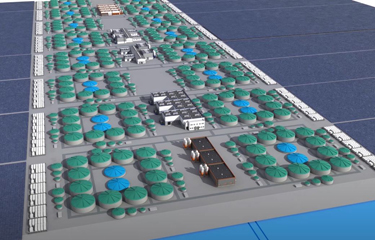Land-based RAS farm planned for holiday resort town in Portugal

Måløy, Norway-based Maiken Foods is the latest company to propose a land-based salmon farm in Europe.
The company’s founder and chairman, Arve Gravdal, has announced his intention to construct the farm using a unique system of individual production units (IPU) in the resort town of Figueira da Foz, Portugal. If successful, the project will be the first land-based salmon farm ever built in the Western European country.
Gravdal, who said his ambition is to “change the game in the fish farming industry,” is now seeking to raise an initial EUR 5 million (USD 5.9 million) through his contact circle to get the farm started, he told SeafoodSource.
“We recently registered the business and have just finished the initial business plan, so the next stage is to raise the capital,” Gravdal said.
Gravdal, an aquaculture engineer and RAS technology provider who has previously worked on land-based aquaculture projects in Europe, Africa, and the United States, already has a patented design for the farm using the IPU system, which he trialed at one of his previous companies, Niri Scotland. This company established a pilot plant located on Scotland’s Campbeltown Peninsula that had successfully ramped up to 40,000 metric tons (MT) of salmon production in 2015. Gravdal sold the company in 2018.
Gravdal’s design is based on individual units that he said are easily made operational, and the farm will make use of solar energy, which is in abundance at the site in Portugal.
“The advantage of using IPUs is that all the tanks, from the smallest to the largest, are fully isolated from each other, with no shared water flow, which will reduce the risk of contamination from pathogens, and also reduce construction and operation costs,” he said. “The design also allows protein for fish feed to be produced from hydrogen and carbon dioxide captured from the fish.”
Since selling Niri Scotland, Gravda said he has honed his design for the new project, for which he has an option on an existing earth pond fish farm in Portugal, with access to sea water and fresh water. The local authorities have indicated in a letter of comfort that he can change the site to a tank farm, and obtain a licence to grow salmon, Gravdal said.
“We will start with two or three small tanks to prove the system, then build out in phases, raising funds, refining our designs and plans, and bringing new people onboard as we go. The tanks are relatively cheap to build and operate as they are individually serviced, and do not require massive investment in large pumping systems,” he said.
The initial plan is based on buying in smolts, with hatchery facilities added later, to enable the company to grow salmon from egg to plate, Gravdal said.
The last stage of production will use very large tanks, each with a capacity to produce a harvest of 500 MT of salmon per year. These tanks will have fully automated feeding, cleaning, and monitoring systems to ensure optimal conditions for the fish.
“We will stock the large tanks with one-kilogram salmon and from there, it will take about six months to grow them to market size of around four kilograms,” Gravdal said.
Gravdal said there is a ready market in Europe for high-quality salmon, and Portugal, Spain, and France will be the initial target markets for Maiken Foods’ salmon.
Gravdal said he is also developing plans to build a similarly-designed land-based salmon farm at Lista in southern Norway, along with his business partner and minicomputer entrepreneur Terje Mikalsen.






Share